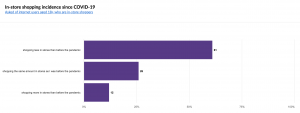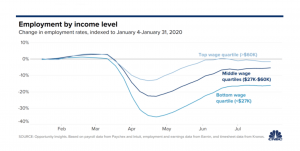In January 2020, the first COVID-19 case was reported in the United States. By March 2020 COVID-19 was declared a global health pandemic and the United States went into a state of national emergency. COVID-19 continues to plague the world, especially the brick-and-mortar retail industry.
A brick-and-mortar store is a local business that operates primarily in person, like a boutique or family-run restaurant. Customers are avoiding these in-person shops out of fears of contracting COVID-19. As a result, many small and local businesses are facing financial hardships within an already run-down economy.
The Center for Disease Control and Prevention (CDC) predicts that by July 2020, 70-90% of the population will be vaccinated, reaching the necessary amount for herd immunity. But what does this mean for brick-and-mortar businesses? Many of these mom-and-pop shops have been forced to file for bankruptcy, lay off their employees, or even shut down completely due to the pandemic and the prioritization of other expenses. This increase in job loss further damages the economy.
Survey obtained from Mintel Database
As stated in a CNBC interview with Craig Johnson, founder of the retail consulting group Customer Growth Partners, “Every year since the dawn of time, the higher-income quintiles spend more … and that same pattern will continue. But it’s not just about income right now, it’s whether or not you have a job.” Without a stable income, people are unable to make any purchases. Some businesses have managed to find success through a transfer to touchless shopping.
Survey obtained from CNBC Database
Touchless shopping has become the new main form of retail. In the past consumers preferred in-person shopping due to the hands-on element, however, this hands-on element now prevents a new danger. This danger is surface transmission. The COVID-19 virus can live on surfaces like plastic or stainless steel for 2 to 3 days, making retail centers a potential spreading hazard. This risk can be minimized by disinfecting surfaces that consumers may touch, however sanitizing every area after every customer is nearly impossible.
The more sustainable solution is a transfer to online shopping, but with web design and new shipping costs, this is not a realistic option for everyone. Online shopping rates have still skyrocketed.
In an interview with J.P. Morgan, Celine Pannuti, Head of European Staples and Beverages Research states “In the data earlier this year, you could see flat growth followed by a huge spike — double digit growth. That is very rare for this industry and was totally prompted by the lockdown and the fact that people couldn’t get out”.
A Mintel survey asked 1,920 internet users aged 18+ who have shopped online in the past 12 months “Of all the shopping you did in the past 12 months, what percentage of the total purchases would you say you made online (as opposed to in a store) pre-COVID-19? What about during COVID-19?”. Pre COVID-19 only 32% of respondents said they shopped online the majority of the time, whereas during COVID-19 58% of respondents said they shopped online the majority of the time.
Survey obtained from Mintel Database
Though this increase in digital shopping is significant, it still has not compensated for the decrease in consumer spending overall. According to a Mckinsey & Company study, “One-third of Americans have reported a decrease in their household income during the crisis, and 40 percent say they are spending more carefully”.
So what can be done to solve this issue? Easy! Shop local! Peoria, Illinois has many small business options, featured in the Peoria magazine. Shopping local allows consumers to be more intentional about where their money is going. They can support businesses with similar values and beliefs. Major corporations, like Amazon, have benefited from the ongoing pandemic, whereas small businesses struggle to make ends meet. By shopping locally, consumers can do their part to invest in their communities. Let me know what local businesses you support in the replies below and be safe, wear a mask!


